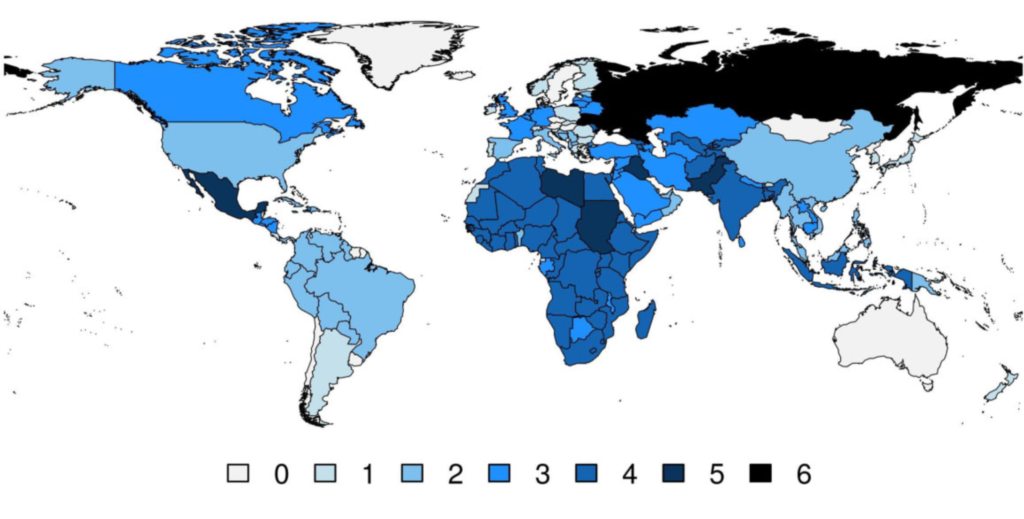Improving Research on Subnational Violence with xSub
Post developed by Yuri M. Zhukov, Christian Davenport, Nadiya Kostyuk, and Katherine Pearson.
How can scholars of political conflict and violence apply research in different settings? Too often, data that are collected and analyzed in one setting cannot inform us about situations in other regions. The problem is not a lack of data. Instead, researchers are unable to make comparisons because variables, definitions, and units of analysis are inconsistent between sources.
xSub, a new freely available resource, solves these problems by building the infrastructure to compare data on political conflicts and violence at a subnational level (i.e., states, cities, and villages).
In a newly-published paper [1], Yuri M. Zhukov, Christian Davenport, and Nadiya Kostyuk introduce xSub, a database of databases that allows researchers to construct custom, analysis-ready datasets. xSub includes data on conflicts in 156 countries, from 21 sources. The project is also collecting data on countries with little or no publicly accessible information about what takes place within them. Additionally, scholars can contribute data they have collected for use by other researchers for future studies.
Why xSub?
Zhukov, Davenport, and Kostyuk describe five main problems with existing datasets:
- Most studies of political conflict aggregate data to the country level (i.e., the situation in Afghanistan or the United States writ large, rather than specific locations and contexts);
- Most micro-level studies focus on very few countries;
- Cross-dataset comparisons are rare;
- Operational definitions of variables (including event categories, actors, and spatial units) vary;
- There are no consistent units of analysis, which might otherwise enable direct comparisons.
To address these problems, xSub provides barrier-free access to data in an analysis-ready format, with consistent definitions, measures, and units. Without the effort to build this infrastructure, the field of study cannot move forward.
What’s in xSub?
xSub makes it easy to compare data across countries and sources because it organizes these data into consistent categories. Here’s what users will find:
- Data sources: 25,112 datasets on the location, dynamics, and intensity of conflict events, in 156 countries (1969–2017), from 21 data sources, with consistent categories and customizable spatiotemporal units.

Number of unique data sources per country
- Actors: xSub organizes data on those involved in conflicts into four categories: government (Side A), opposition (Side B), civilian (Side C), and unaffiliated (Side D).
- Actions: there are 4 general and 27 specific categories of actions, including any use of force, indirect force (e.g. shelling, air strikes, chemical weapons), direct force (e.g. firefights, arrests, assassinations), and protests, both violent and nonviolent.
- Covariates: In addition to conflict, xSub includes multiple variables frequently used in subnational research: e.g., local demographics, geography, ethnicity, and weather.
- Units of analysis: xSub provides event-level and spatial panel datasets. Researchers can choose the geographic units (e.g. countries, provinces, districts, PRIO-GRID cells, and electoral constituencies) and units of time (e.g. years, months, weeks, and days) to analyze. The units that a scholar chooses will affect the distribution of the data, allowing for a more precise description of findings.
How to access xSub
Anyone interested in analyzing xSub data is already able to access it because it is available in a user-friendly web interface and an R package. Removing barriers to access means that anyone from undergraduates to senior researchers will be able to work with these data, gauging whether or not patterns in one country apply to others in the same region or throughout the world.
The interactive web-based interface is available at cross-sub.org. Here scholars can select countries, data sources or units of analysis, preview the data, and download a zipped archive with the requested data and supporting documentation.
More advanced researchers can access the xSub R package at https://cran.r-project.org/package=xSub. This package provides additional functionality not supported by the website, including direct import of data into R and merging of datasets across countries.
By developing xSub, Zhukov, Davenport, and Kostyuk have created a public good that will advance a more meaningful understanding of political violence. With this new tool, researchers are now empowered to answer questions and share data in a way that was impossible until now. With numerous additions underway, the project looks to continue to advance the field into the future.
[1] Zhukov, Y. M., Davenport, C., & Kostyuk, N. (2019). Introducing xSub: A new portal for cross-national data on subnational violence. Journal of Peace Research. https://doi.org/10.1177/0022343319836697

